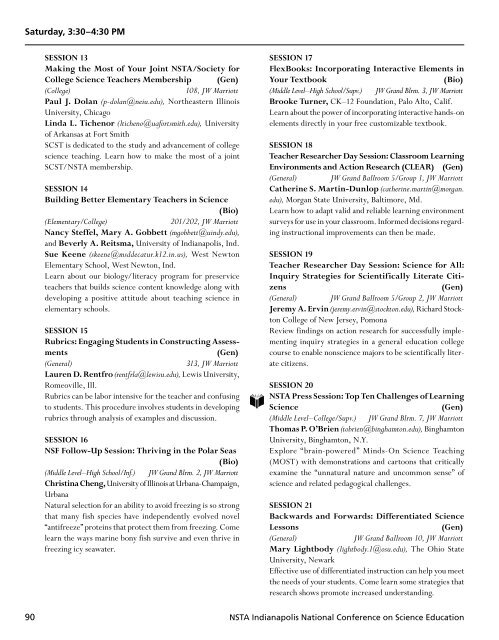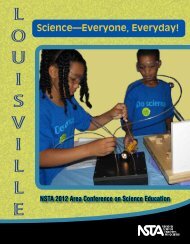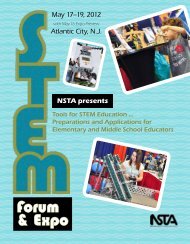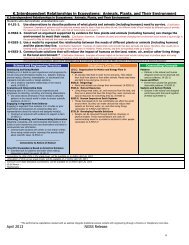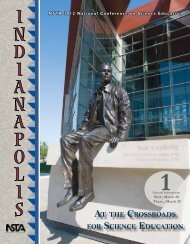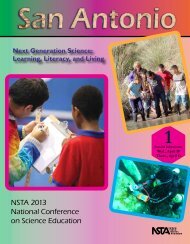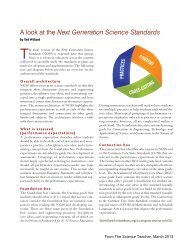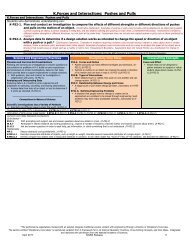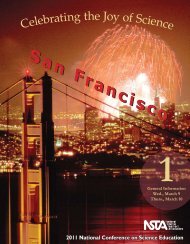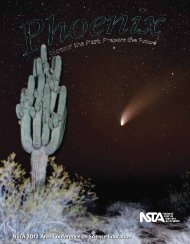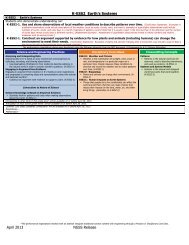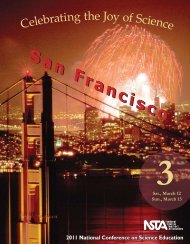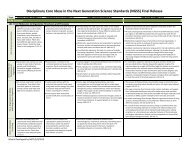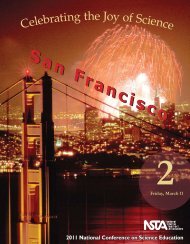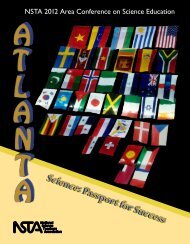Saturday/Sunday
Saturday/Sunday
Saturday/Sunday
Create successful ePaper yourself
Turn your PDF publications into a flip-book with our unique Google optimized e-Paper software.
<strong>Saturday</strong>, 3:30–4:30 PM<br />
SESSION 13<br />
Making the Most of Your Joint NSTA/Society for<br />
College Science Teachers Membership (Gen)<br />
(College)<br />
108, JW Marriott<br />
Paul J. Dolan (p-dolan@neiu.edu), Northeastern Illinois<br />
University, Chicago<br />
Linda L. Tichenor (lticheno@uafortsmith.edu), University<br />
of Arkansas at Fort Smith<br />
SCST is dedicated to the study and advancement of college<br />
science teaching. Learn how to make the most of a joint<br />
SCST/NSTA membership.<br />
SESSION 14<br />
Building Better Elementary Teachers in Science<br />
(Bio)<br />
(Elementary/College)<br />
201/202, JW Marriott<br />
Nancy Steffel, Mary A. Gobbett (mgobbett@uindy.edu),<br />
and Beverly A. Reitsma, University of Indianapolis, Ind.<br />
Sue Keene (skeene@msddecatur.k12.in.us), West Newton<br />
Elementary School, West Newton, Ind.<br />
Learn about our biology/literacy program for preservice<br />
teachers that builds science content knowledge along with<br />
developing a positive attitude about teaching science in<br />
elementary schools.<br />
SESSION 15<br />
Rubrics: Engaging Students in Constructing Assessments<br />
(Gen)<br />
(General)<br />
313, JW Marriott<br />
Lauren D. Rentfro (rentfrla@lewisu.edu), Lewis University,<br />
Romeoville, Ill.<br />
Rubrics can be labor intensive for the teacher and confusing<br />
to students. This procedure involves students in developing<br />
rubrics through analysis of examples and discussion.<br />
SESSION 16<br />
NSF Follow-Up Session: Thriving in the Polar Seas<br />
(Bio)<br />
(Middle Level–High School/Inf.) JW Grand Blrm. 2, JW Marriott<br />
Christina Cheng, University of Illinois at Urbana-Champaign,<br />
Urbana<br />
Natural selection for an ability to avoid freezing is so strong<br />
that many fish species have independently evolved novel<br />
“antifreeze” proteins that protect them from freezing. Come<br />
learn the ways marine bony fish survive and even thrive in<br />
freezing icy seawater.<br />
SESSION 17<br />
FlexBooks: Incorporating Interactive Elements in<br />
Your Textbook<br />
(Bio)<br />
(Middle Level–High School/Supv.) JW Grand Blrm. 3, JW Marriott<br />
Brooke Turner, CK–12 Foundation, Palo Alto, Calif.<br />
Learn about the power of incorporating interactive hands-on<br />
elements directly in your free customizable textbook.<br />
SESSION 18<br />
Teacher Researcher Day Session: Classroom Learning<br />
Environments and Action Research (CLEAR) (Gen)<br />
(General) JW Grand Ballroom 5/Group 1, JW Marriott<br />
Catherine S. Martin-Dunlop (catherine.martin@morgan.<br />
edu), Morgan State University, Baltimore, Md.<br />
Learn how to adapt valid and reliable learning environment<br />
surveys for use in your classroom. Informed decisions regarding<br />
instructional improvements can then be made.<br />
SESSION 19<br />
Teacher Researcher Day Session: Science for All:<br />
Inquiry Strategies for Scientifically Literate Citizens<br />
(Gen)<br />
(General) JW Grand Ballroom 5/Group 2, JW Marriott<br />
Jeremy A. Ervin (jeremy.ervin@stockton.edu), Richard Stockton<br />
College of New Jersey, Pomona<br />
Review findings on action research for successfully implementing<br />
inquiry strategies in a general education college<br />
course to enable nonscience majors to be scientifically literate<br />
citizens.<br />
SESSION 20<br />
NSTA Press Session: Top Ten Challenges of Learning<br />
Science<br />
(Gen)<br />
(Middle Level–College/Supv.) JW Grand Blrm. 7, JW Marriott<br />
Thomas P. O’Brien (tobrien@binghamton.edu), Binghamton<br />
University, Binghamton, N.Y.<br />
Explore “brain-powered” Minds-On Science Teaching<br />
(MOST) with demonstrations and cartoons that critically<br />
examine the “unnatural nature and uncommon sense” of<br />
science and related pedagogical challenges.<br />
SESSION 21<br />
Backwards and Forwards: Differentiated Science<br />
Lessons<br />
(Gen)<br />
(General)<br />
JW Grand Ballroom 10, JW Marriott<br />
Mary Lightbody (lightbody.1@osu.edu), The Ohio State<br />
University, Newark<br />
Effective use of differentiated instruction can help you meet<br />
the needs of your students. Come learn some strategies that<br />
research shows promote increased understanding.<br />
90 NSTA Indianapolis National Conference on Science Education


